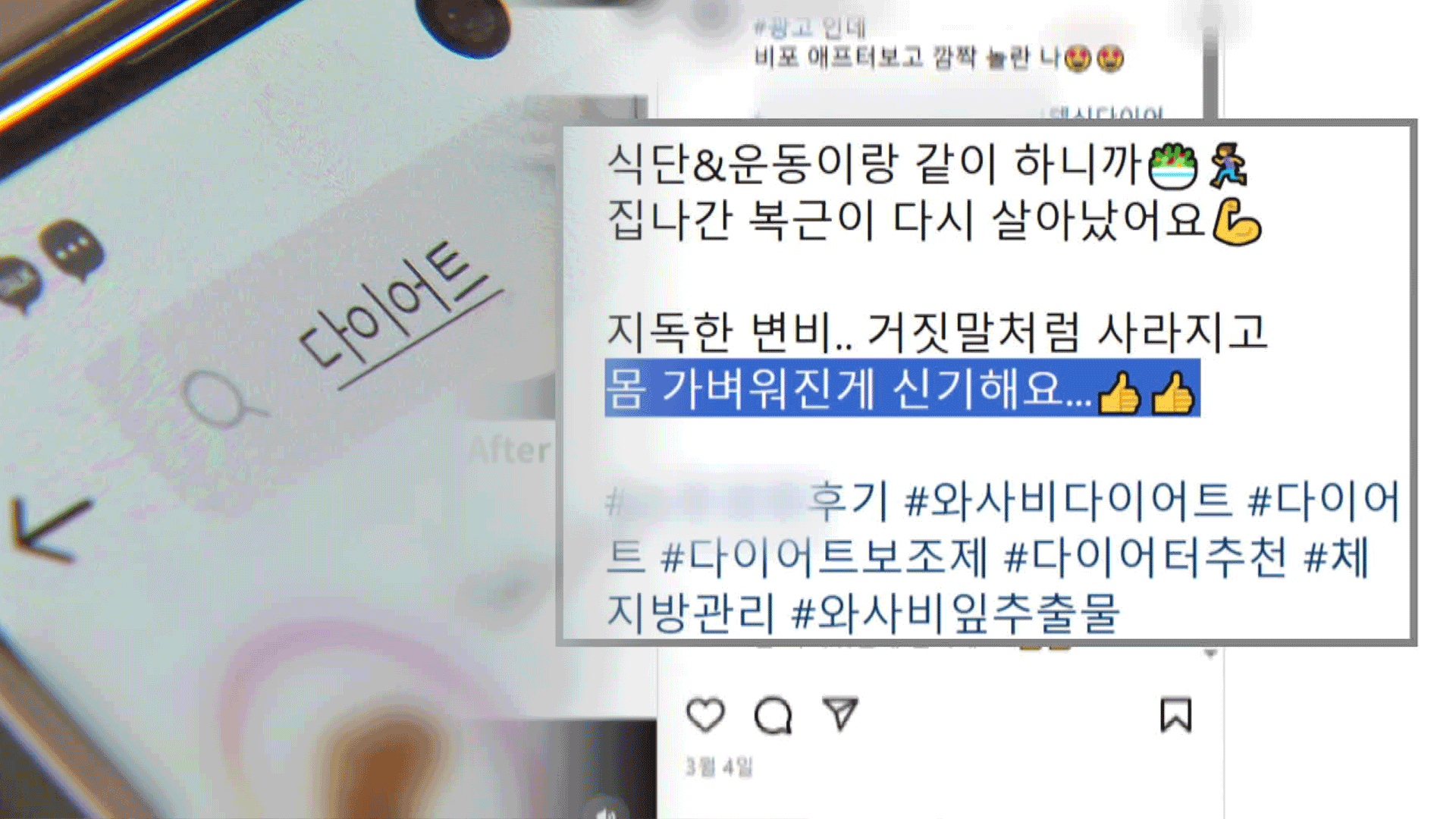[Anchor]
These days, many product advertisements are utilizing short videos known as 'short form' on social media.
Among the advertisements for cosmetics and food that claim to be effective for dieting or disease prevention, a large number of false and exaggerated advertisements have been caught.
Jin Sun-min reports.
[Report]
["The pants I used to wear have become loose."]
This is a short form video advertising a weight loss supplement.
It promotes that taking just one pill a day will make belly fat disappear.
There are enzymes that claim to have excellent appetite suppression effects, nutritional supplements that claim to prevent infertility or women's diseases, a 'filler cream' touted as the secret to youthful skin, and a hair loss prevention shampoo said to be made by a traditional medicine doctor.
Most of these claims are false or exaggerated advertisements.
As a result of the Ministry of Food and Drug Safety's focused inspection of short form advertisements on social media, 147 food products and 73 cosmetics were identified as false advertisements.
Most of these involved misrepresenting regular food as health functional foods (HFF) or advertising cosmetics as if they had medicinal effects.
These short form videos, which reflect individual interests, continue to be exposed on social media.
[Park Young-min/Head of Cyber Investigation Team, Ministry of Food and Drug Safety: "Advertisements exposed on social media are often false. Currently, blocking access is a priority, and it seems there needs to a reivew of the influencers who posted the advertisements."]
Monitoring and review of social media advertisements are lax, making enforcement difficult.
There are calls for stricter management in line with the trend of increasing users.
[Lee Eun-hee/Professor of Consumer Studies, Inha University: "For anyone that creates short-form contents, it would be helpful to post guidelines on particular expressions that cannot be used. It would also make it easier for consumer to report violators."]
The Ministry of Food and Drug Safety urged consumers to check product approval information on the Food and Drug Safety National website if they have any suspicions against the content of short form advertisements.
This is KBS News Jin Sun-min.
These days, many product advertisements are utilizing short videos known as 'short form' on social media.
Among the advertisements for cosmetics and food that claim to be effective for dieting or disease prevention, a large number of false and exaggerated advertisements have been caught.
Jin Sun-min reports.
[Report]
["The pants I used to wear have become loose."]
This is a short form video advertising a weight loss supplement.
It promotes that taking just one pill a day will make belly fat disappear.
There are enzymes that claim to have excellent appetite suppression effects, nutritional supplements that claim to prevent infertility or women's diseases, a 'filler cream' touted as the secret to youthful skin, and a hair loss prevention shampoo said to be made by a traditional medicine doctor.
Most of these claims are false or exaggerated advertisements.
As a result of the Ministry of Food and Drug Safety's focused inspection of short form advertisements on social media, 147 food products and 73 cosmetics were identified as false advertisements.
Most of these involved misrepresenting regular food as health functional foods (HFF) or advertising cosmetics as if they had medicinal effects.
These short form videos, which reflect individual interests, continue to be exposed on social media.
[Park Young-min/Head of Cyber Investigation Team, Ministry of Food and Drug Safety: "Advertisements exposed on social media are often false. Currently, blocking access is a priority, and it seems there needs to a reivew of the influencers who posted the advertisements."]
Monitoring and review of social media advertisements are lax, making enforcement difficult.
There are calls for stricter management in line with the trend of increasing users.
[Lee Eun-hee/Professor of Consumer Studies, Inha University: "For anyone that creates short-form contents, it would be helpful to post guidelines on particular expressions that cannot be used. It would also make it easier for consumer to report violators."]
The Ministry of Food and Drug Safety urged consumers to check product approval information on the Food and Drug Safety National website if they have any suspicions against the content of short form advertisements.
This is KBS News Jin Sun-min.
■ 제보하기
▷ 카카오톡 : 'KBS제보' 검색, 채널 추가
▷ 전화 : 02-781-1234, 4444
▷ 이메일 : kbs1234@kbs.co.kr
▷ 유튜브, 네이버, 카카오에서도 KBS뉴스를 구독해주세요!
- False, exaggerated ads on SNS
-
- 입력 2025-04-22 00:36:30

[Anchor]
These days, many product advertisements are utilizing short videos known as 'short form' on social media.
Among the advertisements for cosmetics and food that claim to be effective for dieting or disease prevention, a large number of false and exaggerated advertisements have been caught.
Jin Sun-min reports.
[Report]
["The pants I used to wear have become loose."]
This is a short form video advertising a weight loss supplement.
It promotes that taking just one pill a day will make belly fat disappear.
There are enzymes that claim to have excellent appetite suppression effects, nutritional supplements that claim to prevent infertility or women's diseases, a 'filler cream' touted as the secret to youthful skin, and a hair loss prevention shampoo said to be made by a traditional medicine doctor.
Most of these claims are false or exaggerated advertisements.
As a result of the Ministry of Food and Drug Safety's focused inspection of short form advertisements on social media, 147 food products and 73 cosmetics were identified as false advertisements.
Most of these involved misrepresenting regular food as health functional foods (HFF) or advertising cosmetics as if they had medicinal effects.
These short form videos, which reflect individual interests, continue to be exposed on social media.
[Park Young-min/Head of Cyber Investigation Team, Ministry of Food and Drug Safety: "Advertisements exposed on social media are often false. Currently, blocking access is a priority, and it seems there needs to a reivew of the influencers who posted the advertisements."]
Monitoring and review of social media advertisements are lax, making enforcement difficult.
There are calls for stricter management in line with the trend of increasing users.
[Lee Eun-hee/Professor of Consumer Studies, Inha University: "For anyone that creates short-form contents, it would be helpful to post guidelines on particular expressions that cannot be used. It would also make it easier for consumer to report violators."]
The Ministry of Food and Drug Safety urged consumers to check product approval information on the Food and Drug Safety National website if they have any suspicions against the content of short form advertisements.
This is KBS News Jin Sun-min.
These days, many product advertisements are utilizing short videos known as 'short form' on social media.
Among the advertisements for cosmetics and food that claim to be effective for dieting or disease prevention, a large number of false and exaggerated advertisements have been caught.
Jin Sun-min reports.
[Report]
["The pants I used to wear have become loose."]
This is a short form video advertising a weight loss supplement.
It promotes that taking just one pill a day will make belly fat disappear.
There are enzymes that claim to have excellent appetite suppression effects, nutritional supplements that claim to prevent infertility or women's diseases, a 'filler cream' touted as the secret to youthful skin, and a hair loss prevention shampoo said to be made by a traditional medicine doctor.
Most of these claims are false or exaggerated advertisements.
As a result of the Ministry of Food and Drug Safety's focused inspection of short form advertisements on social media, 147 food products and 73 cosmetics were identified as false advertisements.
Most of these involved misrepresenting regular food as health functional foods (HFF) or advertising cosmetics as if they had medicinal effects.
These short form videos, which reflect individual interests, continue to be exposed on social media.
[Park Young-min/Head of Cyber Investigation Team, Ministry of Food and Drug Safety: "Advertisements exposed on social media are often false. Currently, blocking access is a priority, and it seems there needs to a reivew of the influencers who posted the advertisements."]
Monitoring and review of social media advertisements are lax, making enforcement difficult.
There are calls for stricter management in line with the trend of increasing users.
[Lee Eun-hee/Professor of Consumer Studies, Inha University: "For anyone that creates short-form contents, it would be helpful to post guidelines on particular expressions that cannot be used. It would also make it easier for consumer to report violators."]
The Ministry of Food and Drug Safety urged consumers to check product approval information on the Food and Drug Safety National website if they have any suspicions against the content of short form advertisements.
This is KBS News Jin Sun-min.
-
-

진선민 기자 jsm@kbs.co.kr
진선민 기자의 기사 모음
-
이 기사가 좋으셨다면
-
좋아요
0
-
응원해요
0
-
후속 원해요
0















이 기사에 대한 의견을 남겨주세요.